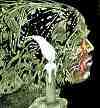
Conclusions
Idle Theory is a slowly expanding way of seeing. A lot of the essays on this website deal with the remote past, both in those parts concerned with the theory of evolution, but also those which deal with early human life. In many ways, Idle Theory as it presently stands has yet to arrive at the present day, and the modern human circumstance. This makes it difficult for any conclusions to be drawn.
But some tentative lines can be sketched out. One of these is that human religious value systems look like they took shape in the remotest antiquity, long before any modern religion had appeared. They are survival values. They are values which got humanity through many difficult times. They are wholly practical in character. They are the values of low idleness societies - societies in which life was one of near-continuous work simply to survive. In modern (and by "modern" is meant of the last 500 years or so) Western society, human idleness has risen sharply, largely thanks to technological innovations - steam engines, internal combustion engines, nuclear power, computers. This has tended to render the ancient values redundant, and has brought the rise of a liberalism which sets out to overthrow ancient taboos and restrictions. There is, as a result, a deep collision taking place between conservatism and liberalism. The collision is more apparent than real.
Probably the most pressing modern problem is to understand the nature of economic systems. Almost all current problems are economic in character: we can put astronauts on the moon, but we can't feed and clothe our own people. There remain enormous disparities in wealth across the planet, and these seem to widen rather than narrow. Usually, these disparities get put down to "greed" or "human nature" (by which is meant greed). But, as Idle Theory sees it, economic systems have their own logic, in which greed plays a minimal role. As Idle Theory sees it, the inherent purpose of the economy is to free people from work, and as such "unemployment" is what economies ought to generate. In the view of Idle Theory, almost all the economic theory generated over the past 200-300 years makes the over-optimistic assumption that human life is largely idle, and that wealth is created by setting people to work.
Idle Theory's economic model is an attempt to construct another understanding of economic systems - of values, prices, profits, etc. But it is very simple, and almost entirely undeveloped. But it offers an outline way of looking at economies, not seeing them as generating "wealth", but instead freeing people from work, providing them with the leisure in which to do what they want to do rather than what they must do. The modern economic problem is that technological innovation has freed people from the production of necessities - only to oblige them to produce luxuries. The result is that modern Western culture is no more idle and leisured now than it has ever been.
I'm neither optimistic nor pessimistic about the human future. If we can understand, and then control, our economic systems, it seems perfectly possible that there could be a human future of leisure for everybody, in which luxuries are manufactured and traded because people want to, and not - as at present - because they have to. In that time, the vast engine of industry will more or less shut down. And in shutting down, it will cease to pollute the world. The immense pressure for everyone to somehow find work will vanish, and with it all the stress-related psychological and physical disorders that attend work and the search for gainful employment. At the same time, the necessity to rob, cheat, steal (which is a form of gainful employment) will also dwindle. In that idle world, life will become 99% play.
I have no idea what such a world would be like, because I don't live in such a world. I have no idea what people would do in such a world. Since there are perfectly good explanations why some people rob and cheat in our present condition, I see no reason to suppose that such people would continue to behave that way in an idle world. There are no Bad Guys in Idle Theory: there are only ignorant busy people.
But the absence of any realistic understanding of the nature of economic systems at present is cause for pessimism in itself: economic chaos is set to continue, for the time being. And war will accompany that chaos. And since now, as for the past 3000+ years, weapons development remains paramount, next to no effort will be put into improving the human state. And human numbers are rising towards unsustainable levels.
As part of the exercise of drawing conclusions, I have two other essays
